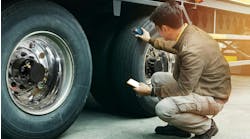"When it comes to servicing electric vehicles, practicing safe work habits is paramount because of the high voltages involved," stresses Dennis "EV Professor" Miles, who heads up the E.V. Technical Institute (www.electricvehicletechnicalinstitute.com), an organization that specializes in electric vehicle technician training. "Extra precautions should always be taken."
Because hybrid electric vehicles, plug-in hybrid electric vehicles and all-electric vehicles have high-voltage electrical systems that range from 100 to 600V, he recommends that any technician who will be working on electric vehicles (EVs) be specifically trained on how to safety maintain and repair them. This training should include:
- Having an understanding of the fundamentals of EVs.
- Being able to identify the types of electric vehicle systems and their major components.
- Having a sound knowledge of high-voltage electrical safety.
- Understanding battery and fire safety pertinent to EVs.
TECHNICIAN SAFETY EQUIPMENT
Technicians also need to have, and know how to use, the required personal protection equipment (PPE) for electric vehicle servicing, says Miles. What's more, the PPE needs to be checked on a regular basis to ensure that it is in good condition.
Among the safety equipment he advises technicians to use when working on high-voltage vehicles:
- Hard hat with flip-down clear visor.
- Safety strap with a belt to pull the technician clear of an incident.
- Safety barrier to maintain clear space around vehicle.
- High-voltage rubber insulating gloves to wear inside of leather welder's insulated gloves for added protection from high voltage.
- Insulating fender covers to protect the technician from shock.
- Eye wash unit and acid neutralizing rinse.
Miles says every shop that services EVs ought to have emergency response procedures in place just in case there is some type of incident or injury.
"Contact the dealer or the manufacturer's fleet sales representative of your EVs and to try to obtain the same instructional and training package that is provided to the dealer technicians," he adds. "If you're negotiating the purchase of new or additional vehicles, try and get that training included as a contractual clause as this could significantly reduce your training expenses."




